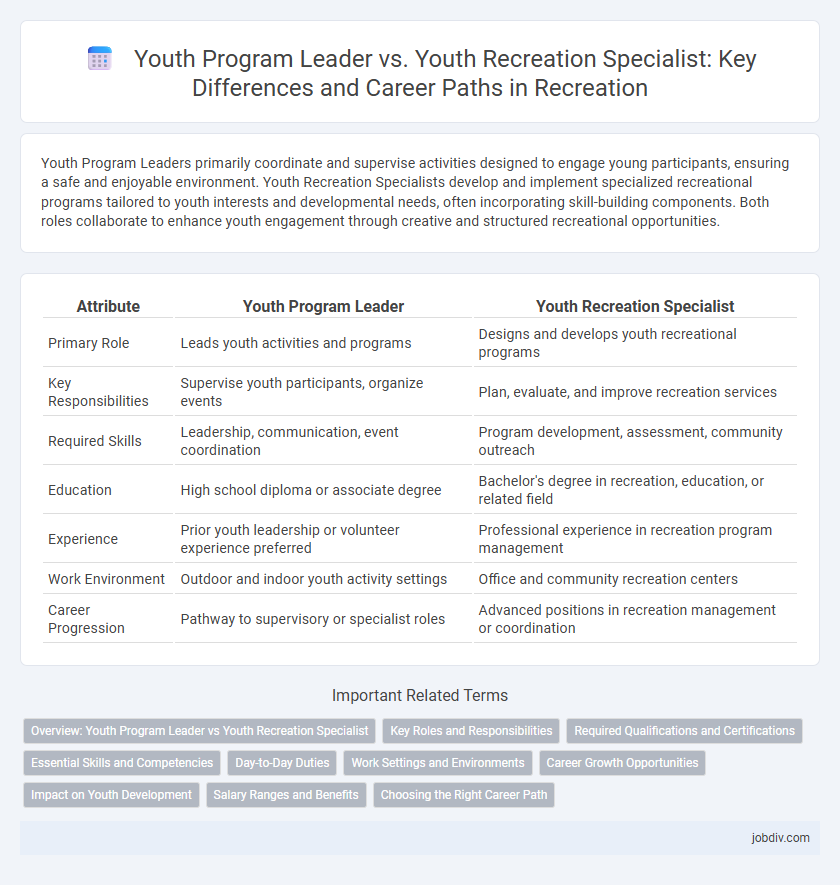Youth Program Leaders primarily coordinate and supervise activities designed to engage young participants, ensuring a safe and enjoyable environment. Youth Recreation Specialists develop and implement specialized recreational programs tailored to youth interests and developmental needs, often incorporating skill-building components. Both roles collaborate to enhance youth engagement through creative and structured recreational opportunities.
Table of Comparison
| Attribute | Youth Program Leader | Youth Recreation Specialist |
|---|---|---|
| Primary Role | Leads youth activities and programs | Designs and develops youth recreational programs |
| Key Responsibilities | Supervise youth participants, organize events | Plan, evaluate, and improve recreation services |
| Required Skills | Leadership, communication, event coordination | Program development, assessment, community outreach |
| Education | High school diploma or associate degree | Bachelor's degree in recreation, education, or related field |
| Experience | Prior youth leadership or volunteer experience preferred | Professional experience in recreation program management |
| Work Environment | Outdoor and indoor youth activity settings | Office and community recreation centers |
| Career Progression | Pathway to supervisory or specialist roles | Advanced positions in recreation management or coordination |
Overview: Youth Program Leader vs Youth Recreation Specialist
Youth Program Leaders focus on organizing and leading structured activities that promote skill development and personal growth among youth, often requiring direct interaction and mentorship. Youth Recreation Specialists typically design and implement comprehensive recreational programs that cater to diverse youth populations while managing resources and ensuring safety standards. Both roles aim to enhance youth engagement but differ in scope, with Leaders emphasizing hands-on facilitation and Specialists prioritizing program development and evaluation.
Key Roles and Responsibilities
Youth Program Leaders primarily coordinate and implement structured activities aimed at developing leadership and social skills among young participants. Youth Recreation Specialists focus on designing, organizing, and evaluating diverse recreational programs to promote physical activity, creativity, and community engagement. Both roles emphasize safety, youth mentorship, and fostering positive environments but differ in strategic program development versus direct activity leadership.
Required Qualifications and Certifications
Youth Program Leaders typically require a high school diploma or equivalent, with certifications in CPR, first aid, and child development being essential to ensure safety and effective supervision. Youth Recreation Specialists often demand higher education credentials, such as an associate's or bachelor's degree in recreation, physical education, or a related field, alongside specialized certifications like Certified Park and Recreation Professional (CPRP). Both roles prioritize experience in youth programming, but specialists tend to have more advanced training in program development and community engagement.
Essential Skills and Competencies
Youth Program Leaders excel in leadership, communication, and conflict resolution, essential for managing group dynamics and facilitating youth engagement. Youth Recreation Specialists possess strong program planning, organizational, and safety management skills, ensuring structured and secure recreational activities. Both roles require empathy and adaptability, but Youth Program Leaders prioritize mentoring, while Recreation Specialists focus on program development.
Day-to-Day Duties
Youth Program Leaders coordinate daily activities, supervise participants, and ensure safety during youth recreational programs. Youth Recreation Specialists design program curricula, manage resource allocation, and evaluate program effectiveness to enhance participant engagement. Both roles require strong communication skills and a commitment to fostering positive youth development.
Work Settings and Environments
Youth Program Leaders typically work in community centers, schools, and recreational facilities, engaging directly with children and teens in organized group activities. Youth Recreation Specialists often operate within municipal parks, specialized youth organizations, or nonprofit agencies, developing and overseeing recreation programs tailored to diverse youth populations. Both roles require adaptability to dynamic, youth-centered environments that promote social, physical, and developmental growth.
Career Growth Opportunities
Youth Program Leaders often begin with entry-level roles, gaining hands-on experience in organizing activities and mentoring participants, which lays the foundation for career advancement. Youth Recreation Specialists typically possess specialized skills in program development, allowing them to design comprehensive recreational plans and potentially move into management or administrative positions within community recreation departments. Both career paths offer growth opportunities through certifications, leadership training, and advanced education in youth development and recreational management.
Impact on Youth Development
Youth Program Leaders directly engage youth in activity planning, fostering leadership skills and social development through hands-on experiences. Youth Recreation Specialists design and implement comprehensive recreational programs that enhance physical, emotional, and cognitive growth in young participants. Both roles significantly contribute to youth development by promoting teamwork, resilience, and healthy lifestyles, but Youth Recreation Specialists emphasize program structure while Youth Program Leaders focus on direct mentorship.
Salary Ranges and Benefits
Youth Program Leaders typically earn an average salary ranging from $30,000 to $45,000 annually, while Youth Recreation Specialists often receive higher pay between $40,000 and $60,000 due to specialized certifications and program management responsibilities. Benefits for both roles commonly include health insurance, paid time off, and retirement plans, but Youth Recreation Specialists may have access to additional professional development funds and performance bonuses. Salary ranges and benefits can vary significantly depending on the geographic location, size of the recreation department, and level of experience.
Choosing the Right Career Path
Youth Program Leaders focus on organizing and supervising activities that promote social development and teamwork, while Youth Recreation Specialists design and implement specialized recreation programs tailored to diverse youth needs. Choosing the right career path depends on your strengths: leadership and event coordination align with a Youth Program Leader role, whereas creating customized recreational experiences suits a Youth Recreation Specialist. Both careers demand strong communication skills and a passion for youth development within recreational settings.
Youth Program Leader vs Youth Recreation Specialist Infographic

 jobdiv.com
jobdiv.com